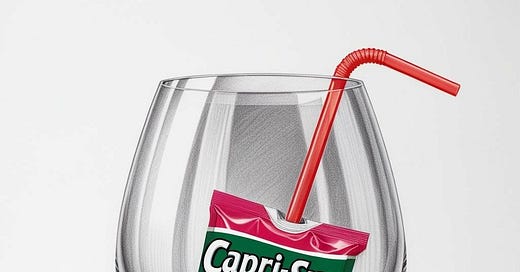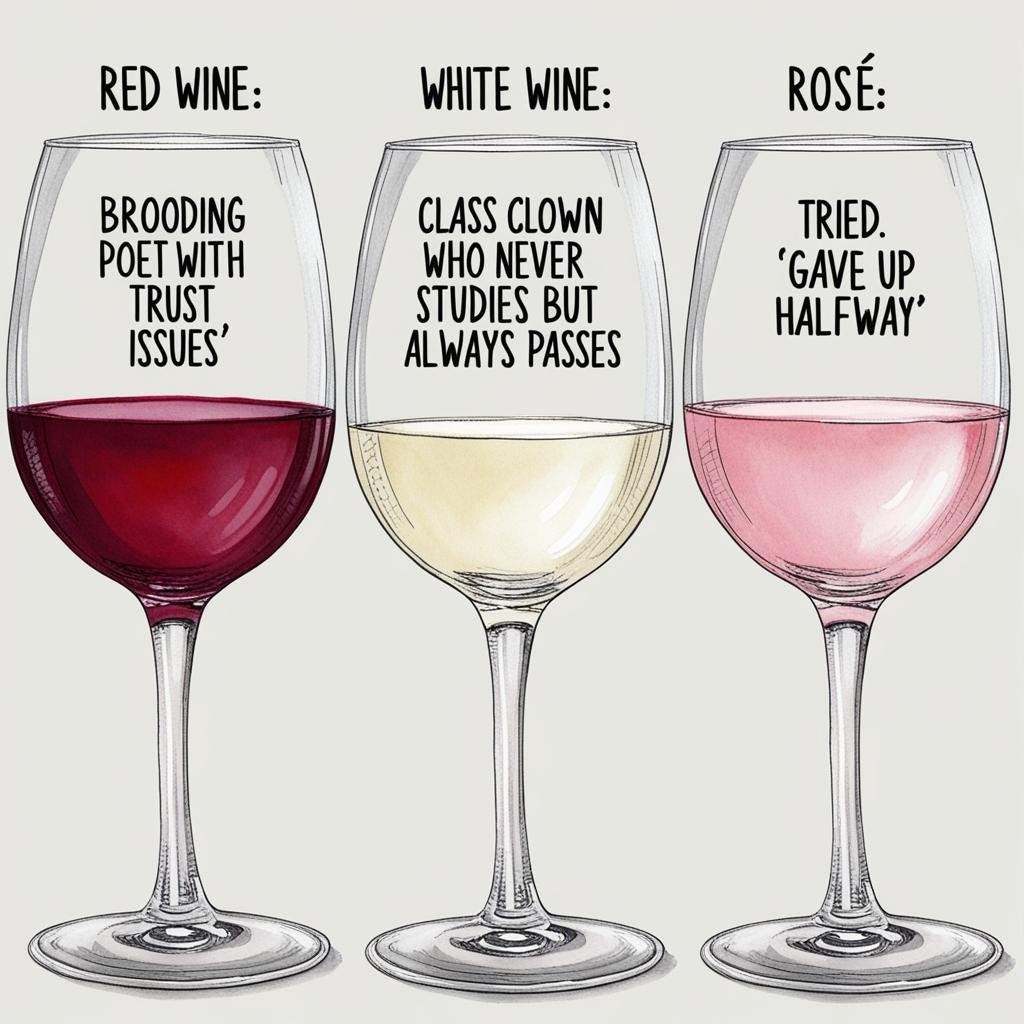Wine Is Just Grape Juice with a Hollywood Makeover. Change My Mind
A toast to The Grape Gatsby! 🍇 Where you’re essentially paying more for fruit, and for wine descriptions that sound like they came out of The Hamlet.
Look, I’ve tried. I’ve swirled the glass, sniffed aggressively like a bloodhound, pretended to detect notes of oak, sandalwood, and cinnamon, seasoned lightly with the creeping suspicion that I’m making this up. I’ve gone the whole nine yards. And after all this, I have come to the undeniable conclusion that wine, all wine, is just grape juice that went to private school.
There, I said it. All wine tastes the same.
“Oh Laura, but the aging process!” I can hear you cry. Aging what? Grapes? The same fruit that turns into raisins if you leave them in the sun for too long?
Girl. Sit down.
“But it goes through a very sophisticated transformation!” Oh, does it? Because to me it just looks like a glorified waiting game. I mean I’ve left yogurt in the fridge for a month, but you don’t hear me calling it a “Vintage 2003 Fermented Cow Essence Masterpiece”!
The “Art” of Tasting Is Just Peer Pressure in a Glass
Wine culture is a scam. And I say that with my full chest.
Wine enthusiasts love to talk about body, acidity, tannins, aroma, fullness and “mouthfeel”. First of all, mouthfeel? What in the poetic nonsense is that? Everything has a mouthfeel. Water has a mouthfeel. Mashed potatoes have a mouthfeel. Omena has a mouthfeel. You don’t hear anyone swirling a lump of ugali and saying, “Mmm, so robust, yet silky with a long finish…” No, because we have dignity.
And what even are tannins? I have never, in my years of casual sipping and pretending to be cultured, thought, Wow, these tannins are hitting different today. What are they? Where do they live? Can I see them? No? Then they don’t exist. I know a scam when I see one.
People act like there’s so much nuance to wine. And there probably is. They say that aging wine makes such a huge difference, and it probably does. That the older the wine, the more special it is. And that’s probably true. But let’s be honest; there are only about 418 officially designated Masters of Wine in the world. Which means that most of us can’t tell the difference between a 20-year-old Bordeaux and last Thursday’s boxed Ceres.
Yet there will always be that one person who went for ONE wine tasting session and is now a self-proclaimed “aficionado”. Telling us how we shouldn’t just drink it all down in one go but instead, “let the wine dance on your tongue”. Ma’am. It’s liquid. It doesn’t dance. It just sits there, being wine.
And now, because I decided to indulge your delulu, this one sip has been sitting and swirling in my mouth so long that it is all warm and saliva-ry, and I just want to spit all out.
Girl sit down.
Wine “Flavors” & Descriptions Are Just Poetry for Drunk People
If wine descriptions were honest, they’d just say “Tastes Like Grapes” But why must they always be so dramatic?
“This wine boasts of hints of blackberry, vanilla, and dark chocolate.” Ah yes, my three favorite things to throw into a protein shake.
“An earthy aroma with undertones of leather and smoke.” Okay, so it tastes like a cowboy’s jacket and a shisha parlor. Great.
“A Prosecco with a playful, effervescent finish and a whisper of crispy apple.” I don’t know what kind of apples you’ve been whispering to, but mine don’t taste like anything except well…apples. And why would I ever need my wine to be “playful”?! 😒
“A brooding Cabernet Sauvignon with deep, smoky overtones and a strong tannic backbone.” It’s a beverage, not a mysterious duke from Bridgerton with a tragic past. Also, tannic backbone? Since when do drinks need spinal support?
Let’s not even start on the wines that apparently have a “bright citrus undertone and a minerally finish”. Because there’s nothing quite like sipping on liquified gravel with a squeeze of lemon. If I wanted to taste minerals, I’d go lick a rock!
The more I come across these over-the-top wine descriptions, the stronger my urge to peel the dramatics right off our sommeliers from AliExpress. Because all of their grapes-plaining is often from these absurd tasting notes:
Do you notice the unique warm vanilla notes in this one?” No, but I do notice that it tastes exactly like the last three wines.
Oh I detect hints of blackcurrant, oak, and a whisper of leather…Leather?! Be honest; have you ever actually tasted leather? If so, I have a lot of follow-up questions.
“Ah, but this one has a subtle peppery finish” Right. Because we’re sipping barbecue meat, not wine.
The Existential Crisis of Fermented Grapes: Red vs. White vs. Whatever That Third One Is
I shouldn’t care this much about the workings of wine. I don’t even drink. But I’ve spent the last 15 or so paragraphs complaining, I’m already in too deep and there’s no point in stopping now. So can we talk about the red vs white debacle for a second?
We can agree that a lot of things in life are about personal choice and preferences. Cereal first vs milk first. Pajama gang vs the nude sleepers 👀. Cat people vs dog people. Coffee vs tea. Some people prefer red wine. Others prefer white.
And that’s totally okay. Variety is indeed the spice of life.
But what I CANNOT stand, what I will always roll my eyes at, is people who turn their wine preferences into a personal trait:
🍷 “I only drink red wine because I’m sophisticated but attachment-avoidant.” You are drinking it in a plastic cup at three in the morning at some random house rave. You and your fellow zodiac “grand rising”enthusiasts need to SIT DOWN!
🍸 “My ex used to drink only white wine because he fears commitment”. What does that even mean?!
🍷 “I like how red wine makes me look mysterious.” Yes, because nothing screams intrigue like having purple-stained teeth.
🍸“I only drink white because it feels light and airy just like me.” Girl, it’s fermented fruit. Not a cloud.
Personal preference is great and all, but sometimes people need to be judged (if you pour milk first you are capable of murder and I’m totally judging you). Because the reality is that there isn’t a deep, philosophical difference between red and white. They are just grapes that went through different traumatic experiences. Let’s break it down:
Red wine: Grapes with commitment issues and grumpy attitudes. They keep their skin on and develop deep, moody flavors. Part-time poet.
White wine: Grapes that like to keep it light. No skin, less drama. Great sense of humor and always gets invited to the party. The class clown who never studies but somehow always passes.
Rosè: The middle child trying to please everyone. Is honestly just red wine that started off strong but got tired and gave up halfway.
It’s just your preference, not your personality! So love whatever wine color you want, show us how you’re waiting for your wine to “breathe” ,but don’t sit there with your eyes closed like you’re receiving a prophecy, and tell us that your wine preference emotionally and spiritually embodies who you are.
Expensive vs. Cheap Wine: A $500 Lesson In Pretensiousness and Branding
I get it. Fine wine is supposedly well-aged. But I’m not spending $499 on a pretentious bottle of wine from 1847, when I can’t even taste the difference from a $6 grocery store bottle. They both taste like grapes that were left in a dark room to think about their life choices.
I promise I’m not just being a tasteless hater; I’ve got the science to back me up! Blind studies have proven that when people are given the same wine in different bottles, they’ll suddenly start tasting “deep complexity” in the one that looks fancier and rate the cheaper-looking one lower.
Blind taste tests have also shown that even sommeliers (the actual “wine wizards”) cannot always reliably tell cheap wine from the fancy stuff. And it gets quite complex that some of them refuse to do blind taste tests, because they cannot risk wrongly identifying the wines! Don’t believe me, ask Forbes!
So if that’s the case, what are we really paying for? The illusion of wealth? A label with a castle on it? A bottle that looks expensive enough to display on your counter so that people will think you have taste and tip their hats at you?
From where I’m standing your “refined taste” looks more like you’re just the unfortunate victim of capitalist mind games and good branding. I mean can you actually taste the “oak” or are you just tasting the splinters from your cork that fell in when you clumsily opened the bottle?
Because no matter the price, the brand, or the supposed terroir (which is just a fancy way of saying “this vineyard had a nice breeze once”), the minute it’s poured into a decanter (which is just a bougie glass jug), every wine and its cousin all taste “surprisingly smooth” and “rather delightful”.
So if it’s all fermented grape juice in different outfits, why not just go with the one that’s on sale and call it a day?
The Only Real Difference in Wine: How Much You Drink
We have established that most people can’t tell a $500 bottle from a $15 bottle of wine. But you know what they can tell apart?
A full glass from an empty one.
That’s the only distinction that really matters. Because at the end of the day, all wine leads to the same destination:
Tipsy-town.
No matter which one you pick, they all end up turning into liquid confidence that makes you believe your dance moves are exceptional. Until the next morning, when your headache suggests otherwise. The only real difference between a dry Merlot and a fruity Moscato is how many sips it takes before you start texting your ex.
So, the next time someone swirls and sniffs their glass of Four Cousins pontificating about “the delicate balance of acidity and fruit,” just nod, take a sip, and say,
“Mmm, yes. Aged grape juice. Simply exquisite.”
Because when all is said and done, we know the truth: wine is just grape juice with a superiority complex and an excellent PR team.







